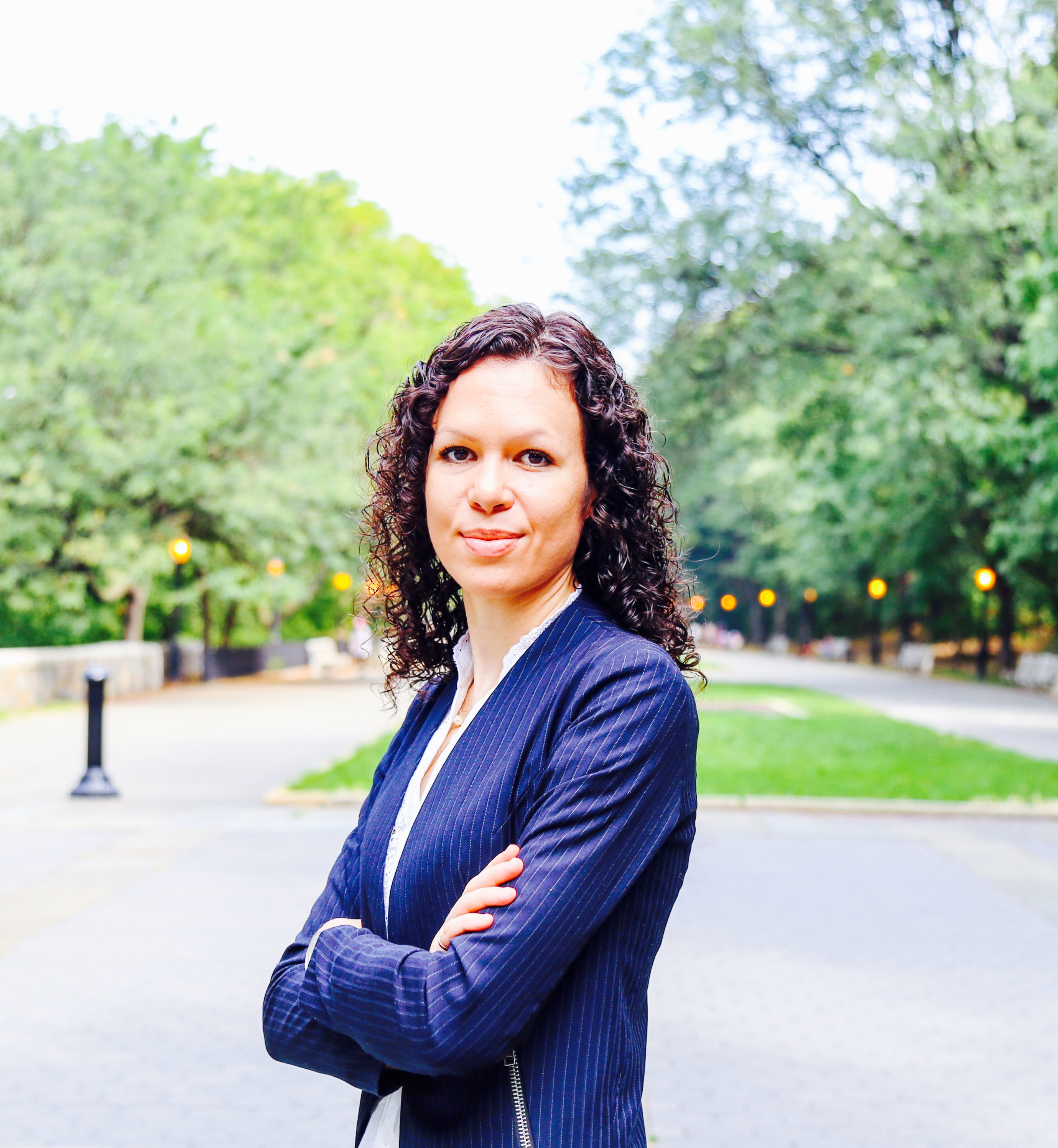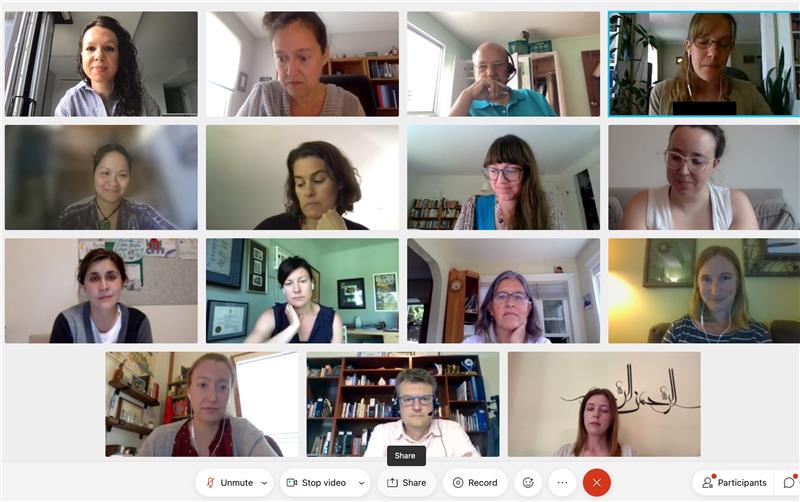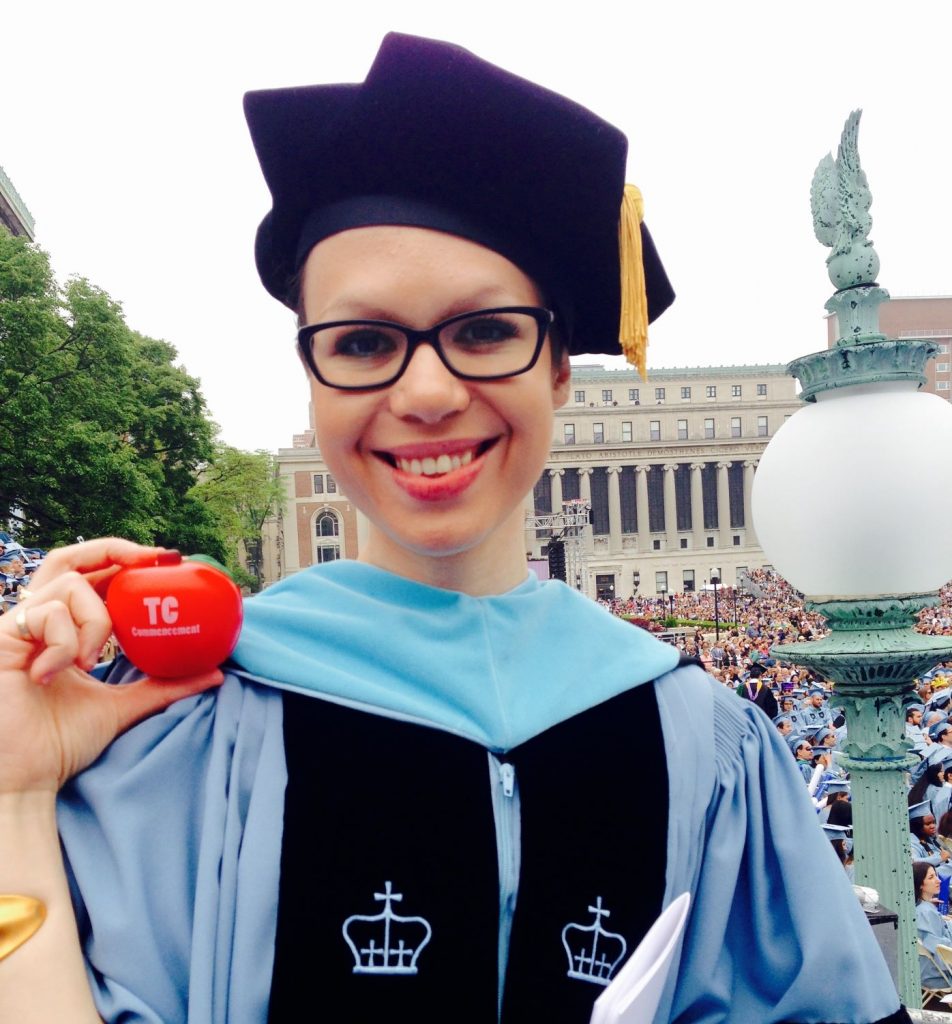SIT opens its doors to first doctoral students
Students' passions are key to program's success, director says
September 8th, 2021 | School for International Training, SIT Graduate Institute

The first doctoral program offered by the School for International Training (SIT) launched this summer with an 11-person cohort. The new three-year EdD program is based on a hybrid learning model, incorporating synchronous and asynchronous learning for students to earn a doctoral degree while working.
The global education program is designed to prepare professionals in the field of comparative and international education.
“We’re looking for passionate social changemakers,” says Dr. Alla Korzh, academic director of SIT’s new EdD program.
“Someone who is really interested in examining education issues through a theoretical lens and rigorous research and then use those findings to create some level of change in the local communities,” she says, adding that she and her colleagues look for candidates who have concrete ideas about what they want to research.

The First Cohort
All but one of the doctoral students in the first cohort are from the U.S.—two are based overseas in China and Italy. The group is female dominated with only one male student who is from Germany and based in Morocco.
“I’m incredibly excited about these students,” says Korzh.
Most of the students have extensive professional experience—all but two of them have been working in the education field for 15–25 years.
Students recently finished a three-week residency during which they took three core classes: Theoretical Foundations I, Research Methods I, and Reflective Practice Doctoral Seminar I.
“The program is very intense,” wrote one student in her evaluation after the summer residency.
“It’s quite an undertaking,” agrees Korzh, who designed the innovative curriculum. “What excites me the most is seeing students happy and thriving in our program.”
The program is built on the cohort model in which students enter and remain together throughout the program. The cohort offers support, intellectual rigor, and diverse perspectives, enriching the student experience and creating a strong community of practice.
For example, students read each other’s work and offer constructive peer feedback in all classes.
Korzh says this prepares them for various responsibilities and roles they’re likely to hold in the future, such as leading discussions or conference panels and serving as peer reviewers in academic journals or elsewhere.
“We’re preparing them for their future careers now through different assignments,” she says.
The SIT Difference
What makes this program unique is the reflective practice doctoral seminar. It takes students from the conceptualization stage of research and guides them until the end of the dissertation.
The global education doctoral program enables students who finish their dissertation to choose a variety career paths. For instance, those on an academic track could pursue a career as a university professor, while those on an alternative track would be prepared for executive-level positions at a higher education institution, nonprofit organization, or think tank. Others who wish to continue examining and analyzing education systems and programs may opt to pursue a research track.
Like many doctoral programs, there’s a lot of emphasis on student autonomy and the research interest of each student.
“What makes this program unique is the reflective practice doctoral seminar,” says Korzh. “It takes students from the conceptualization stage of research and guides them until the end of the dissertation.”
Speaking from her own personal experience, Korzh recognizes that it can be overwhelming for incoming students to know they have to produce a 200- to 250-page dissertation. “Not knowing how they’ll get there can feel like being thrown into a dark forest,” she says.
Students recognize, however, that through the interwoven curriculum, they are “being walked through the forest.”
The doctoral seminar breaks the process down into smaller pieces and shows students how each part builds on another. Each semester doctoral students develop parts of their dissertation and meet with their advisors monthly to begin conceptualizing their topic, formulating their research question, exploring the literature, and designing their dissertation study.
In addition, there is a doctoral manual that includes a flowchart of what the journey looks like so “they can see the big picture,” says Korzh.
This is something I strongly believe in as an educator—to push the intellectual boundaries and the comfort zone of our students. Let them be uncomfortable for a moment as they grapple with different ideas, concepts, and theories, expand their world view and imagine the unimaginable, and consider how they can use the tools of research, for example, and of practice to create social change in society through education.
“It is doable,” she says. “You will be guided by your advisor. And you will have the support of your cohort. You will be providing and receiving constructive feedback and you won’t be left alone.”
Korzh says she took an introspective approach when she designed the program, drawing on her own doctoral experience at Teacher’s College, Columbia University in New York City, which she completed in 2013.
“I had an incredibly rigorous and challenging doctoral experience,” says Korzh, who completed her MEd in instructional leadership from the University of Illinois in Chicago.
“This is something I strongly believe in as an educator,” she says, “to push the intellectual boundaries and the comfort zone of our students. Let them be uncomfortable for a moment as they grapple with different ideas, concepts, and theories, expand their world view and imagine the unimaginable, and consider how they can use the tools of research, for example, and of practice to create social change in society through education.”
Korzh’s research focuses on education inequities experienced by socio-economically disadvantaged children, youth, and adults at the secondary and post-secondary education levels.
Emphasis on Research Methods and Theory
Looking back at her academic journey, she believes the most useful courses were in theory and research methods, preparing her to be a qualitative researcher. Now, as the director of the doctoral program she wants to ensure her students at SIT are armed with rigorous research skills.
“It’s not always built into the curriculum as the foundation of doctoral programs,” she says.
“I would say this is something that makes the program unique,” says Korzh, adding that a theoretical foundation and rigorous research training are fundamental, allowing students to understand the field of comparative and international education and examine education issues through research.
Incoming doctoral students have one research methods course prerequisite. Korzh says she and her colleagues want to make sure their students have some foundational understanding of how to conduct research because “we’re not starting from scratch here.”
Still, she believes it’s not enough to know how to conduct research.
“They really need extensive training experience,” she says. She built into the curriculum four research methods courses to make sure students are exposed to qualitative and quantitative research methods, learning data analysis, and interpretation skills.
In addition, students cover ethical and political considerations in conducting research globally, as well as conducting research with vulnerable populations.
Program Structure
The entire doctoral program is 60 credits. Students who hold a master’s degree in a relevant field such as comparative international education, international education development, or education broadly defined can transfer 12 credits, which helps reduce the cost.
Part-time students will take no more than eight credits a semester.
Korzh says the program is meant for full-time or part-time doctoral students. “They aspire to get a doctoral degree, but they don’t want to give up their job and leave their home for an on-campus program.”
That also distinguishes it from many other doctoral programs in education. Korzh says there are pros and cons of each model.
"When you are on campus you have to face the opportunity cost of giving up your job—you have no steady income and as a student you live at the poverty level,” she explains. “At the end of it, you have to re-enter the labor market again.”
SIT’s global education doctoral program will be open to new applicants every two years. Currently the department of international and global education has two master’s cohorts at the same time and will be launching a new global master’s in international education this fall.
We want to make sure students develop camaraderie and a community of practice throughout their entire coursework, so they become their best supporters and cheerleaders.
Explaining why there won’t be a new doctoral cohort each year Korzh says “it allows us to focus on our programs and students, and make sure everything is under control and running effectively.”
She adds: “We realize we can only be in one place at one time.”
Unlike at other academic institutions, doctoral classes are not open to the master’s students. Korzh admits that as a master’s student she benefitted from sitting in the same classes as doctoral students but decided against it when designing SIT’s program.
“We intentionally limited our doctoral classes to EdD program students only and don’t allow them to be audited to keep the cohort community cohesive and intact,” she says. “We want to make sure students develop camaraderie and a community of practice throughout their entire coursework, so they become their best supporters and cheerleaders.”
Applications Re-open in 2022
The next round of applications for the EdD program is due in November 2022. Those accepted will begin the program with the summer residency in 2023.
Korzh says SIT received about 40 applications for 10 spots for the first cohort of the global education doctoral program.
As part of the application, students are asked to submit a personal statement and Korzh advises applicants to invest considerable energy in it.
“Students really need to take it seriously and offer a concrete idea of why they want to pursue this doctorate,” she says. “This is where they can shine.”
She emphasizes that applicants need to demonstrate a clear idea for their research topic and why it matters.
“They really need to think through the significance of the topic. Why should the world care?” she says.
During a webinar for prospective doctoral students and others, she generously offers to meet applicants one-on-one virtually to discuss their dissertation topic.
She says having a half-hour session with a prospective student helps to get to know them before the admissions stage. “It’s an additional piece of data. I get to know their dissertation project ideas and what drives them to undertake doctoral studies,” she says.
Korzh also recommends preparing well for the interview and advises students not to neglect the quality of professional and academic recommendations, “which give us three additional pieces of data to look at.”
Director's Academic Journey and Challenges
Alla Korzh was born in Ukraine when it was part of the Soviet Union. She remembers being fascinated with the rest of the world which, for many years, was closed to her.
She completed a bachelor’s degree with honors at the Nizhyn State Pedagogical University, one of the oldest institutions of higher learning in Ukraine.

Eventually, she came to the United States, finding her niche through the exploration of issues in education, first in the U.S. context, and then back to the world.
During her master’s studies in Chicago at the University of Illinois, she recalls, the entire curriculum focused on racial and economic inequities in urban public schools.
“I honestly couldn’t relate to those experiences as I had never been a product of the U.S. public school system,” says Korzh, “and I kept thinking about the educational inequities faced by marginalized or disadvantaged children around the world who don’t even have the same resources and the same opportunities as some of the children in the U.S. schools.”
These disparities continued to nag at her. She knew her calling was to focus on marginalization, disenfranchisement, and inequities in education globally.
It brought her doctoral thesis back to Ukraine, and more specifically, orphans.
She recalls: “At that time it was a taboo topic.”
Referring to children whose parents had abandoned them and were institutionalized in orphanages, Korzh says, “Historically everyone knew about them, but no one wrote about how they were segregated in these self-contained schools where abuse was happening, and they were not mainstreamed with other children.”
Before taking on this academic challenge, she faced an even larger personal challenge: learning to write in academic English at age 21 upon coming to the U.S. for graduate work.
She said she studied English back home but not from native instructors and had much to “unlearn” from her Ukrainian teachers.
English wasn’t the only personal hurdle.
“How do you start thinking critically when all of my education in Ukraine was based on memorization and rote learning, never questioning authority, never questioning the author, never dissecting the arguments?” Korzh says.
She adds: “There was a lot of discomfort within my own learning process because I had to almost shed that skin of my early educational upbringing and then relearn and develop a different mindset and acquire new skills as a thinker and writer.”
What Incoming Students Can Expect
“There will be bumps along the way,” says Korzh, emphasizing once again that the doctoral program in global education is “intense and intensive,” but there will be “spaces to breathe.”
Korzh says: “For me, at the heart of the success of the EdD program lies student passion. It’s a secret sauce for one’s success.”
“You’re committed to that topic and that topic becomes your life for a period of time. You are committed to something you want to explore and examine to better understand that phenomenon and to share that knowledge with the world,” she says.
“And hopefully, “Korzh adds, “you can apply those research findings to enact social change.”
